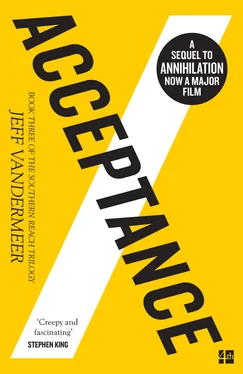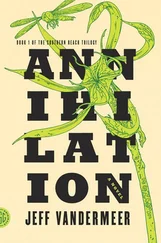As the conversation unspools, you keep faltering and losing track of it. You say things you don’t mean, trying to stay in character—the person the biologist knows you as, the construct you created for her. Maybe you shouldn’t care about roles now, but there’s still a role to play.
She’s blaming you, but you can’t blame her. “If it was a disaster, you helped create it. You just panicked, and you gave up.” Not true—you never gave up—but you nod anyway, thinking of so many mistakes. “I did. I did. I should have recognized earlier that you had changed.” True. “I should have sent you back to the border.” Not true. “I shouldn’t have gone down there with the anthropologist.” Not true, not really. You had no choice, once she slipped away from base camp, intent on proving herself.
You’re coughing up more blood, but it hardly matters now.
“What does the border look like?” A child’s question. A question whose answer means nothing. There is nothing but border. There is no border.
I’ll tell you when I get there.
“What really happens when we cross over?”
Not what you might expect.
“What did you hide from us about Area X?”
Nothing that would have helped you. Not really.
The sun is a weak halo with no center and the biologist’s voice threads in and out, the sand both cold and hot in your clenched right hand. The pain that keeps returning in bursts is attacking every couple of microseconds, so present that it isn’t even there anymore.
Eventually, you recognize that you have lost the ability to speak. But you are still there, muffled and distant, as if you’re a kid lying on a blanket on this very beach, with a hat over your eyes. Lulled into drowsiness by the constant surging sound of the water and the sea breezes, balancing the heat that ripples over you, spreads through your limbs. The wind against your hair is a sensation as remote as the ruffling of weeds sprouting from a head-shaped rock.
“I’m sorry, but I have to do this,” the biologist tells you, almost as if she knows you can still hear her. “I have no choice.”
You feel the tug and pull on your skin, the brief incisive line, as the biologist takes a sample from your infected shoulder. From a great and insurmountable distance, searching hands descend as the biologist goes through your jacket pockets. She finds your journal. She finds your hidden gun. She finds your pathetic letter. What will she make of them? Maybe nothing at all. Maybe she’ll just throw the letter into the sea, and the gun with it. Maybe she’ll waste the rest of her life studying your journal.
She’s still talking.
“I don’t know what to say to you. I’m angry. I’m frightened. You put us here and you had a chance to tell me what you knew, and you didn’t. You wouldn’t. I’d say rest in peace, but I don’t think you will.”
Then she’s gone, and you miss her, that weight of a human being beside you, the perverse blessing of those words, but you don’t miss her for long because you are fading further still, fading into the landscape like a reluctant wraith, and you can hear a faint and delicate music in the distance, and something that whispered to you before is whispering again, and then you’re dissolving into the wind. A kind of alien regard has twinned itself to you, easily mistaken for the atoms of the air if it did not seem somehow concentrated, purposeful. Joyful?
Taken up over the still lakes, rising up across the marsh, flickering up in green-glinting reflections against the sea and the shore in the late-afternoon sun … only to wheel and bank toward the interior and its cypress trees, its black water. Then sharply up into the sky again, taking aim for the sun, the lurch and spin of it, before free fall, twisting to stare down at the onrushing earth, stretched taut above the quick flash and slow wave of reeds. You half expect to see Lowry there, wounded survivor of the long-ago first expedition, crawling toward the safety of the border. But instead there is just the biologist trudging back down the darkening path … and waiting beyond her, mewling and in distress, the altered psychologist from the expedition before the twelfth. Your fault as much as anyone’s, your fault, and irrevocable. Unforgivable.
As you curve back around, the lighthouse fast approaches. The air trembles as it pushes out from both sides of the lighthouse and then re-forms, ever questing, forever sampling, rising high only to come low yet again, and finally circling like a question mark so you can bear witness to your own immolation: a shape huddled there, leaking light. What a sad figure, sleeping there, dissolving there. A green flame, a distress signal, an opportunity. Are you still soaring? Are you still dying or dead? You can’t tell anymore.
But the whisper isn’t done with you yet.
You’re not down there.
You’re up here.
And there’s still an interrogation going on.
One that will repeat until you have given up every answer.
PART I
0001: THE LIGHTHOUSE KEEPER
Overhauled the lens machinery and cleaned the lens. Fixed the water pipe in the garden. Small repair to the gate. Organized the tools and shovels etc. in the shed. S&SB visit. Need to requisition paint for daymark—black eroded on seaward side. Also need nails and to check the western siren again. Sighted: pelicans, moorhens, some kind of warbler, blackbirds beyond number, sanderlings, a royal tern, an osprey, flickers, cormorants, bluebirds, pigmy rattlesnake (at the fence—remember), rabbit or two, white-tailed deer, and near dawn, on the trail, many an armadillo.
That winter morning, the wind was cold against the collar of Saul Evans’s coat as he trudged down the trail toward the lighthouse. There had been a storm the night before, and down and to his left, the ocean lay gray and roiling against the dull blue of the sky, seen through the rustle and sway of the sea oats. Driftwood and bottles and faded white buoys and a dead hammerhead shark had washed up in the aftermath, tangled among snarls of seaweed, but no real damage either here or in the village.
At his feet lay bramble and the thick gray of thistles that would bloom purple in the spring and summer. To his right, the ponds were dark with the muttering complaints of grebes and buffleheads. Blackbirds plunged the thin branches of trees down, exploded upward in panic at his passage, settled back into garrulous communities. The brisk, fresh salt smell to the air had an edge of flame: a burning smell from some nearby house or still-smoldering bonfire.
Saul had lived in the lighthouse for four years before he’d met Charlie, and he lived there still, but last night he’d stayed in the village a half mile away, in Charlie’s cottage. A new thing this, not agreed to with words, but with Charlie pulling him back to bed when he’d been about to put on his clothes and leave. A welcome thing that put an awkward half smile on Saul’s face.
Charlie’d barely stirred as Saul had gotten up, dressed, made eggs for breakfast. He’d served Charlie a generous portion with a slice of orange, kept hot under a bowl, and left a little note beside the toaster, bread at the ready. As he’d left, he’d turned to look at the man sprawled on his back half in and half out of the sheets. Even into his late thirties, Charlie had the lean, muscular torso, strong shoulders, and stout legs of a man who had spent much of his adult life on boats, hauling in nets, and the flat belly of someone who didn’t spend too many nights out drinking.
A quiet click of the door, then whistling into the wind like an idiot as soon as he’d taken a few steps—thanking the God who’d made him, in the end, so lucky, even if in such a delayed and unexpected way. Some things came to you late, but late was better than never.
Читать дальше












